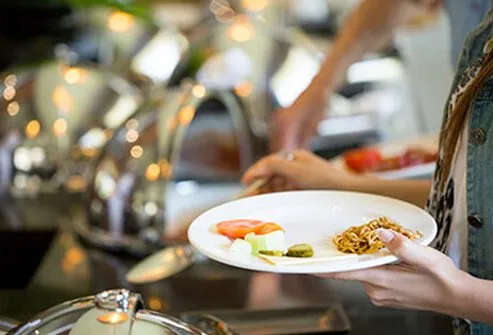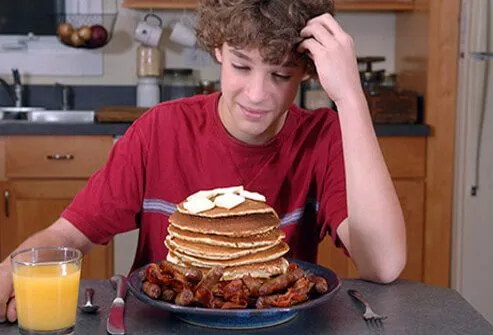I want to eat more fruits and veggies.

Make a pledge to yourself to eat at least one more piece of produce at every meal. Then do things that help you to keep your promise. Place cut-up veggies in plastic baggies or containers in the fridge where you can regularly see them. Keep low-fat yogurt, hummus, peanut butter, and other healthy dips on hand. Add extra veggies to everyday staples like pizzas, soups, omelets, salads, and sandwiches to get extra nutrition. Cauliflower puree provides an extra nutritional punch when added to mashed potatoes.
I want to eat less fast food.

The best way to avoid fast food is to steer clear of temptation. Alter your route so you don’t go near fast food venues. Keep healthy snacks, like nuts and dried fruit, on hand to munch on between meals. If you do eat at a fast food restaurant, choose the healthiest options available. Low-fat chili, baked potatoes, and grilled chicken are great options. Salads are perfect. Just be sure to choose low-fat dressing or a little bit of vinegar, lemon, or olive oil. Regular soda is a sugar bomb. Choose water or diet sodas instead. Skip value meals and supersizing. Regular and small portion sizes help control fat and calorie intake.
I want to snack healthier.

Snacking can help you stick with your nutritional goals if you choose wisely. Skip carb-laden chips and cookies and choose fresh seasonal fruit, pretzels, trail mix, or a small serving of nuts. Low-fat yogurt can be a great snacking option as long as it doesn’t have too much sugar. Whole-wheat crackers with low-fat cheese can be very satisfying. Check in with your body and don’t confuse states like stress and boredom with hunger.
I want to dine out less.

Meal planning and cooking at home can help you stick to your nutritional goals and avoid unhealthy restaurant meals. A slow cooker can be a great time saver. Cook in large batches and freeze at least half of what you make. Healthy breakfasts are often faster and easier to whip up than lunches and dinners. You can enjoy omelets with veggies and oatmeal with fruit any time of the day.
I want to avoid mindless eating.

Humans eat for many reasons other than hunger, but by being conscious of your habits you can take control. Eat only when you feel hungry and stop eating before you feel full. Don’t eat while distracted. Eating while watching TV or on the computer leads to increased calorie intake. Being in touch with your body and your hunger cues will help you take control of your eating and your waistline.
I want to snack less at work.

Studies show that proximity and visibility of food increases consumption of it. In the office, it’s best not to keep unhealthy snacks around, or at the very least keep them out of sight. Research proves that people tend to eat more of a food when it is within easy reach. Stash snacks at least 6 feet away from your desk at work. This can minimize mindless snacking while it forces you to get up if you want something to eat. It’s best to eat lunch away from work, your computer, and other distractions.
I want to eat smart at restaurants.

You can eat out and still stick to your diet and nutrition goals. It just requires planning ahead and using some simple strategies. Order off the children’s menu or choose dishes that come in small portion sizes. Don’t arrive at a restaurant famished -- you’ll be more likely to overeat. Eat a piece of fruit or another small snack before you go to the restaurant. Start your meal with a clear (not cream-based) soup or a salad to curb hunger and help prevent overindulging in fat and calories. Share your dish with someone or ask the waiter or waitress to pack half of it to go. Skip the bread basket and tortilla chips.
I want to eat less sugar.

One 12-ounce can of regular soda has at least 30 grams of sugar. That’s about 8 teaspoons of sugar! Replacing one daily can of regular soda with water, unsweetened tea, or diet soda, will help you reduce your daily sugar intake. Pick unsweetened cereals and eat fresh fruit or fruit canned-in-water instead of sugary counterparts.
I want to eat breakfast every day.

When time is short in the morning, you can take breakfast with you on the go. Don’t eat while driving! Yogurt, instant oatmeal, fresh fruit, breakfast bars, and granola are excellent portable breakfast options. Baked goods like bagels and muffins often come in very large portion sizes. Be mindful of how much you eat or choose healthier options. It’s important to eat something in the morning to kick start your metabolism, even if it’s not traditional breakfast fare.
I want to plan to eat right.

Lack of time is a common obstacle to healthy eating, but it doesn’t have to be. Planning ahead helps ensure you’ll stay on track with healthy food choices. Leave the house with snacks like fruit, cereal, or trail mix. Stash healthy frozen meals in the freezer for nights you arrive home too late to cook. Keep a mental list about which supermarkets and restaurants in your area have healthy food options like grilled chicken, clear (non-cream based) soups, and salads. Being prepared and having a plan means you’ll be less likely to succumb to poor food choices.
I want to eat smart at parties.

Unhealthy foods at parties can be tempting, but using a few tricks will help you stay on track. Have a nutritious snack before you head out the door, so you’re not starving when you get there. Choose a small plate and make sure at least half of it has fruits and veggies. Eat, enjoy your meal, and then step away from the buffet or where ever the food is kept. Being in close proximity to the food may encourage snacking. Be mindful of liquid calories. It’s easy to consume more calories than intended when indulging in soda or alcohol.
I want to keep track of what I eat.

Keeping a food diary is a great way to discover the connection between your diet and emotions. A food journal can help you become aware of your patterns. There are even apps you can download to your smart phone or tablet for that purpose. Food journaling doesn’t have to be forever. Keeping one for just a few days or once a week can help you refine your nutrition goals.
I want to learn to say "No".

It’s not always easy to stick with healthy food choices, especially when you’re being pressured by outside forces. Slip ups may happen when a coworker brings homemade treats into the office or a waiter may tell you it’s impossible to have sauce on the side with your entrée. Indulging periodically won’t derail your healthy eating plans, but doing so often will. Kindly let others know you’re doing your best to make healthy food choices or decline any treats you’re offered. In reality, you don’t owe anyone any explanation for the choices you make. Eating well is investing in your own health.
I don't want to overeat.

Size matters. Dr. Brian Wansink, author of the book, Mindless Eating, says that people tend to eat 22% less when eating off of a 10-inch round plate compared to a 12-inch plate. Other ways to eat less include: using smaller spoons to serve portions, scrutinizing everything that goes on your plate to determine if you really want it, and eating slowly and listening to your body’s cues about when you are full. Serving yourself in the kitchen from the stove instead of at the table can also help you eat less.
I want to find support to eat healthy.

Eating foods that are good for you is easier when you are around other people who are doing the same. Enlist a food buddy and check in frequently, promising to keep each other accountable for healthy eating goals that you both have set. Plan and eat healthy, nutritious meals together as a family; support one another in making good choices. There are even apps and websites that can help you set and track your healthy eating goals.
I want to be successful.

Changing what and how you eat takes some effort, but it’s well worth it. Remember, change is a process. You don’t need to overhaul your dietary habits all at once. You can use post-it notes with inspirational quotes to help keep yourself motivated. Think of some non-food treats you’d like, maybe a new cookbook, a massage, or herbal teas. Reward yourself for meeting your goals. It’ll help keep you motivated to make more positive changes.
Healthy Eating: 16 Resolutions for Better Habits
This tool does not provide medical advice. See additional information: 
© 1996-2024 WebMD, LLC. All rights reserved.
